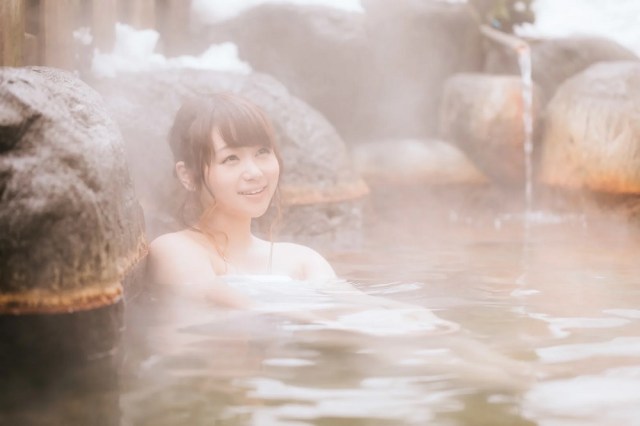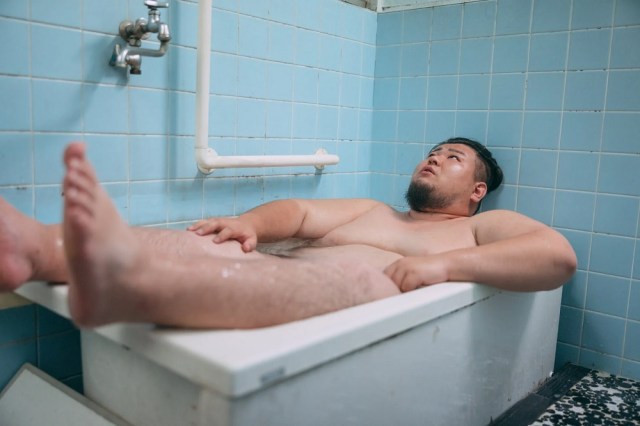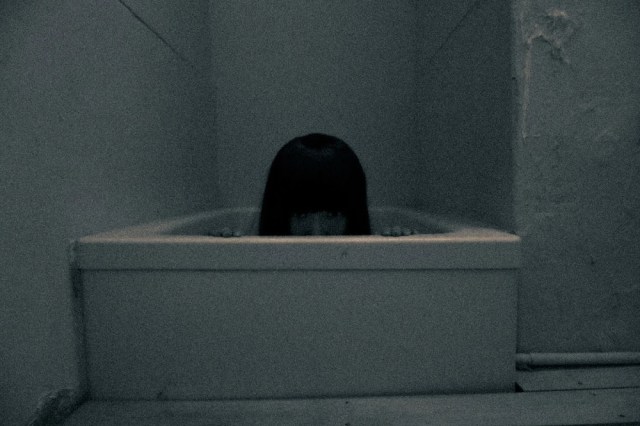
Which came first, the frequent soaks or the day-to-day happiness?
Bathclin, a Japanese maker of household bathroom cleaning and air freshener products, recently conducted a study in collaboration with researchers from Tokyo City University’s Department of Human Sciences. For the survey, 300 men and women between the ages of 20 and 69 were asked a series of questions about their bathing (as in taking a bath, not simply showering) and state of mental and physical health.
Participants were divided into two groups: high-frequency bathers, defined as people who take a bath four or more times a week, and low-frequency bathers, who take baths three or fewer times per week. When the data was sifted, the researchers say that the high-frequency bathers reported a significantly higher average level of happiness in their daily lives. The frequent bathers were also more satisfied with the quality of their sleep, awakening feeling more rested than the low-frequency bathers, and also reported higher levels of self-assessed subjective feelings of healthiness, which was backed up by lower average levels of doctor-diagnosed health issues during their regular medical examinations.
So that’s it then, taking more baths clearly makes people happier, so hopping in the tub more often is a simple and surefire way to create a happier life for yourself, right? Actually, it might not be so simple. Though the survey suggests that more baths and more happiness are connected, that doesn’t necessarily mean that the former is the cause of the latter.
First, let’s look at why someone might not take a bath. The most obvious reason is that taking a bath takes more time than taking a shower. This is particularly true in Japan, where you’re supposed to completely wash and rinse your body in the shower before dipping so much as a toe into the bathtub. This practice originated with Japan’s communal bathing culture and families who take turns soaking in the same tub of hot water, in order to keep the bathwater clean. However, it’s such an engrained part of Japanese bathing customs that even people who live alone will wash and shower off completely before getting in the tub. The idea of washing yourself in the tub, then soaking in the grimy bathwater, is considered pretty gross, even if it’s your own grime.
In other words, by the time you get into a Japanese bath, you’re actually already clean, making the bath a completely discretionary use of your time. The less free time and energy you have, whether because you’re busy with work, child-rearing, or other responsibilities, the less likely you are to take a post-shower soak, and conversely, having that extra free time and energy, perhaps because you didn’t have to run yourself ragged doing all your daily duties, the more often you’re going to take a bath.
▼ If you’re too tired to stay awake on your train ride home from work, going to bed is going to sound more tempting than going in the tub.
Along with time, money is another always-desirable resource that can influence bath frequency. It’s true that just about every home or apartment in Japan has a bathtub, as shower-only residences are incredibly rare. However, the quality and spaciousness of those bathtubs can vary greatly depending on how luxurious the home is. On the lower end of the economic prosperity scale, cheaper housing will often have only a small, comparatively cramped tub, sometimes in a square shape that only allows you to squat in it, lacking sufficient space to stretch out your legs and really relax.
▼ Oh, yeah, my life is great…
▼ I’ve lived in multiple apartments in Japan with bathtubs just like this one (minus the terrifying ghost girl).
Less expensive apartments also may have the tub and toilet in the same room (as opposed to a separate chamber just for the toilet), and the soothing ambiance of the bath can be somewhat diminished when your head is in arm’s reach of where you poop, making at-home baths less appealing and thus less frequent.
So while the study found a connection between bath frequency and happiness, you could also say that there are connections between bath frequency and both free time and disposable income, both of which are obviously, all else equal, going to contribute to a greater sense of happiness and well-being, as well as lower levels of stress and, by extension, higher quality of sleep. It might not be that frequent baths make people happy, but rather that people who are leading a pretty happy life are the same people who actually can take frequent baths.
Ultimately, “people who take more baths are happier” is probably similar to other studies that have found that people who kiss their spouse goodbye in the morning before going to work make more money. It could be that a smooch gives them extra energy to power through the challenges of the day, or it could be that couples who are regularly both awake and have time for a confirmation of their romantic devotion before work are already making a good enough living that they’re not exhausted and in a mad dash to get to their exhausting job they have to slave away at to make ends meet.
All that said, it’s understandable that Bathclin, as a maker of bath cleaning products, would want to trumpet a connection between bathing and happiness, in order to convince people to clean their bathtubs frequently, which is honestly good advice anyway, just like telling your spouse you love them when you get the chance.
Source: Maido News via Livedoor News
Top image: Pakutaso
Insert images: Pakutaso (1, 2, 3)
● Want to hear about SoraNews24’s latest articles as soon as they’re published? Follow us on Facebook and Twitter!
Follow Casey on Twitter, where he could go for a nice long soak right now.




 Rub-a-dub-dub and relax in a tub: Survey reveals wintertime bathing habits across Japan
Rub-a-dub-dub and relax in a tub: Survey reveals wintertime bathing habits across Japan How to have a Japanese rotenburo bath experience without leaving your home【Photos】
How to have a Japanese rotenburo bath experience without leaving your home【Photos】 Japan’s awesome, eco-friendly, old-school water heaters (and how to use them)
Japan’s awesome, eco-friendly, old-school water heaters (and how to use them) How not to bathe at a public bathing facility in Japan
How not to bathe at a public bathing facility in Japan Tips from Japan to make your skin extra beautiful! It begins with a bath and…
Tips from Japan to make your skin extra beautiful! It begins with a bath and… Seaside scenery, history, and so many desserts on Yokohama’s Akai Kutsu【Japan Loop Buses】
Seaside scenery, history, and so many desserts on Yokohama’s Akai Kutsu【Japan Loop Buses】 Foreigner’s request for help in Tokyo makes us sad for the state of society
Foreigner’s request for help in Tokyo makes us sad for the state of society Red light district sushi restaurant in Tokyo shows us just how wrong we were about it
Red light district sushi restaurant in Tokyo shows us just how wrong we were about it Japanese city loses residents’ personal data, which was on paper being transported on a windy day
Japanese city loses residents’ personal data, which was on paper being transported on a windy day We try all-you-can-eat raw eggs for 730 yen, turns out to be way better than it sounds
We try all-you-can-eat raw eggs for 730 yen, turns out to be way better than it sounds Harajuku Station’s beautiful old wooden building is set to return, with a new complex around it
Harajuku Station’s beautiful old wooden building is set to return, with a new complex around it Do Hi-Chew-flavor Hi-Chews have a reason to exist?【Taste test】
Do Hi-Chew-flavor Hi-Chews have a reason to exist?【Taste test】 Should you add tartar sauce to Japanese curry rice? CoCo Ichi makes diners an unusual offer
Should you add tartar sauce to Japanese curry rice? CoCo Ichi makes diners an unusual offer Host club royalty Roland demonstrates his night-time routine, claims it’s not dissimilar to yours
Host club royalty Roland demonstrates his night-time routine, claims it’s not dissimilar to yours Japanese vending machine dispenses ultra-rare gold Coca Cola can prize
Japanese vending machine dispenses ultra-rare gold Coca Cola can prize McDonald’s new Happy Meals offer up cute and practical Sanrio lifestyle goods
McDonald’s new Happy Meals offer up cute and practical Sanrio lifestyle goods Japanese ramen restaurants under pressure from new yen banknotes
Japanese ramen restaurants under pressure from new yen banknotes French Fries Bread in Tokyo’s Shibuya becomes a hit on social media
French Fries Bread in Tokyo’s Shibuya becomes a hit on social media Studio Ghibli releases new action figures featuring Nausicaä of the Valley of the Wind characters
Studio Ghibli releases new action figures featuring Nausicaä of the Valley of the Wind characters New private rooms on Tokaido Shinkansen change the way we travel from Tokyo to Kyoto
New private rooms on Tokaido Shinkansen change the way we travel from Tokyo to Kyoto Tokyo Tsukiji fish market site to be redeveloped with 50,000-seat stadium, hotel, shopping center
Tokyo Tsukiji fish market site to be redeveloped with 50,000-seat stadium, hotel, shopping center Beautiful Ghibli sealing wax kits let you create accessories and elegant letter decorations【Pics】
Beautiful Ghibli sealing wax kits let you create accessories and elegant letter decorations【Pics】 Studio Ghibli releases Kiki’s Delivery Service chocolate cake pouches in Japan
Studio Ghibli releases Kiki’s Delivery Service chocolate cake pouches in Japan New definition of “Japanese whiskey” goes into effect to prevent fakes from fooling overseas buyers
New definition of “Japanese whiskey” goes into effect to prevent fakes from fooling overseas buyers Our Japanese reporter visits Costco in the U.S., finds super American and very Japanese things
Our Japanese reporter visits Costco in the U.S., finds super American and very Japanese things All-you-can-drink Starbucks and amazing views part of Tokyo’s new 170 meter-high sky lounge
All-you-can-drink Starbucks and amazing views part of Tokyo’s new 170 meter-high sky lounge More foreign tourists than ever before in history visited Japan last month
More foreign tourists than ever before in history visited Japan last month New Pokémon cakes let you eat your way through Pikachu and all the Eevee evolutions
New Pokémon cakes let you eat your way through Pikachu and all the Eevee evolutions Disney princesses get official manga makeovers for Manga Princess Cafe opening in Tokyo
Disney princesses get official manga makeovers for Manga Princess Cafe opening in Tokyo Sales of Japan’s most convenient train ticket/shopping payment cards suspended indefinitely
Sales of Japan’s most convenient train ticket/shopping payment cards suspended indefinitely Sold-out Studio Ghibli desktop humidifiers are back so Totoro can help you through the dry season
Sold-out Studio Ghibli desktop humidifiers are back so Totoro can help you through the dry season Japanese government to make first change to romanization spelling rules since the 1950s
Japanese government to make first change to romanization spelling rules since the 1950s Ghibli founders Toshio Suzuki and Hayao Miyazaki contribute to Japanese whisky Totoro label design
Ghibli founders Toshio Suzuki and Hayao Miyazaki contribute to Japanese whisky Totoro label design Doraemon found buried at sea as scene from 1993 anime becomes real life【Photos】
Doraemon found buried at sea as scene from 1993 anime becomes real life【Photos】 Tokyo’s most famous Starbucks is closed
Tokyo’s most famous Starbucks is closed One Piece characters’ nationalities revealed, but fans have mixed opinions
One Piece characters’ nationalities revealed, but fans have mixed opinions We asked a Uniqlo employee what four things we should buy and their suggestions didn’t disappoint
We asked a Uniqlo employee what four things we should buy and their suggestions didn’t disappoint Princesses, fruits, and blacksmiths: Study reveals the 30 most unusual family names in Japan
Princesses, fruits, and blacksmiths: Study reveals the 30 most unusual family names in Japan Onsen in Japan uses the same mysterious hot spring bathing system from Ghibli film Spirited Away
Onsen in Japan uses the same mysterious hot spring bathing system from Ghibli film Spirited Away Apartments with no bath or shower rising in popularity among young Tokyoites, report says
Apartments with no bath or shower rising in popularity among young Tokyoites, report says Sink or drink? Japan celebrates arrival of this year’s Beaujolais Nouveau with special wine-bath
Sink or drink? Japan celebrates arrival of this year’s Beaujolais Nouveau with special wine-bath Relax in a bath that smells like … miso soup and ramen with these bath powders from Japan!
Relax in a bath that smells like … miso soup and ramen with these bath powders from Japan! Japanese idol singers offer bottles of their used bathwater to fans at eye-popping price
Japanese idol singers offer bottles of their used bathwater to fans at eye-popping price Can the lowest-rated portable bathtub on Amazon Japan make our office a relaxing bathhouse?【Pics】
Can the lowest-rated portable bathtub on Amazon Japan make our office a relaxing bathhouse?【Pics】 Resident Evil Umbrella green, red herb bath salts now exist in real world, are terrifying【Pics】
Resident Evil Umbrella green, red herb bath salts now exist in real world, are terrifying【Pics】 Over half of Japanese adults do this in the shower – How about you?
Over half of Japanese adults do this in the shower – How about you? A private onsen bath with a karaoke machine is two of Japan’s best things with zero embarrassment
A private onsen bath with a karaoke machine is two of Japan’s best things with zero embarrassment Miniature sento bathhouse range is this season’s must-buy gacha capsule toy collection
Miniature sento bathhouse range is this season’s must-buy gacha capsule toy collection What’s furry and wet and irresistibly cute? Otters … in your bath! [Video]
What’s furry and wet and irresistibly cute? Otters … in your bath! [Video] Tokyo condo frees up space by putting a shower in the kitchen
Tokyo condo frees up space by putting a shower in the kitchen Hidden gem in Tokyo: Black water hot spring hotel
Hidden gem in Tokyo: Black water hot spring hotel Soak in a sand bath in Beppu, Japan’s famous onsen region
Soak in a sand bath in Beppu, Japan’s famous onsen region Our Japanese reporter visits Czechia’s famous beer spas and boozily bathes in a bath of beer
Our Japanese reporter visits Czechia’s famous beer spas and boozily bathes in a bath of beer
Leave a Reply